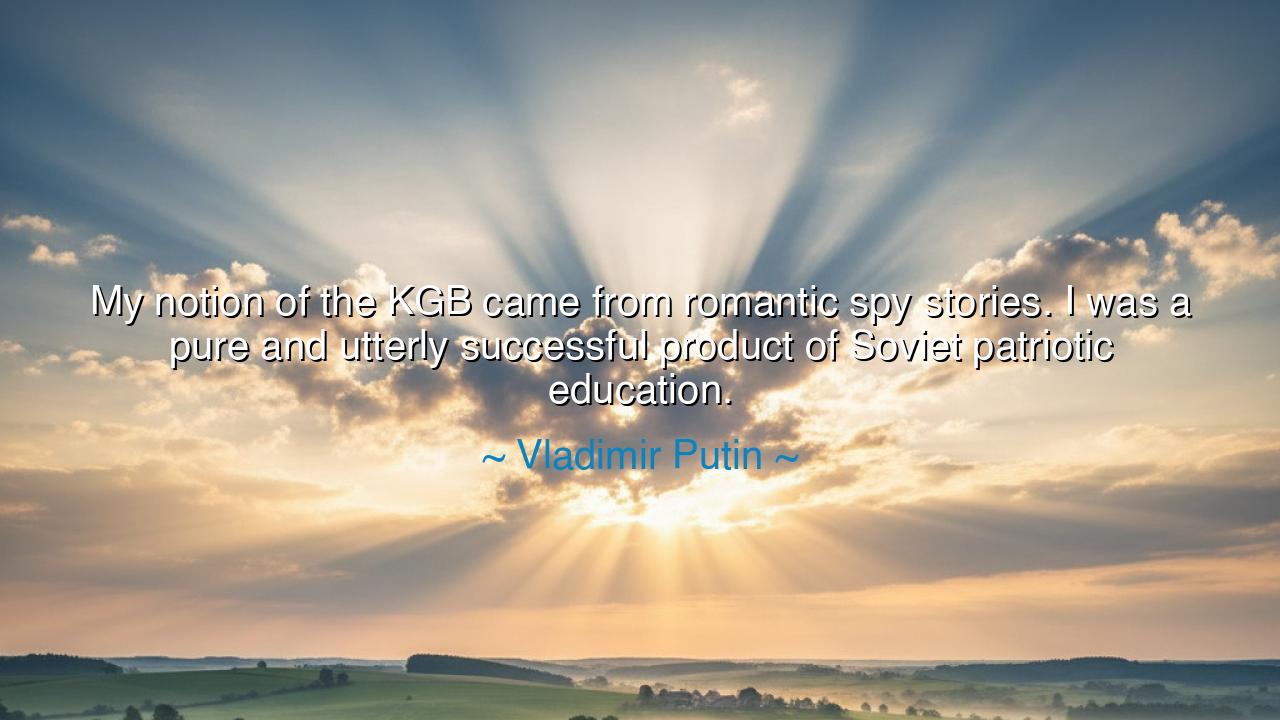
My notion of the KGB came from romantic spy stories. I was a pure
My notion of the KGB came from romantic spy stories. I was a pure and utterly successful product of Soviet patriotic education.






"My notion of the KGB came from romantic spy stories. I was a pure and utterly successful product of Soviet patriotic education." These words, spoken by Vladimir Putin, reveal a profound reflection on the way history, education, and culture shape one’s perception of the world. In them lies the story of a man whose early understanding of the world was molded by the ideals and propaganda of a regime, and how these ideals shaped his identity and his actions. The KGB, once a symbol of secrecy, power, and control, was portrayed through the lens of romanticism—a world where spies and operatives were heroes, waging covert wars for the glory of their nation. But as Putin confesses, this romantic view was not the reality, but the creation of a patriotic education that blurred the line between fiction and fact.
In the ancient world, heroes were often defined by their loyalties—to their country, to their families, or to their gods. The great epic tales of antiquity—such as Homer’s Iliad or Virgil’s Aeneid—celebrated warriors who fought not just for personal gain, but for the greater good of their people. Their stories were steeped in glory and honor, and through them, nations were shaped. In the same way, the Soviet Union crafted a narrative where individuals like Putin were shaped by ideals that promoted loyalty to the state above all else. The KGB, much like the ancient warriors, was portrayed as an institution of honor, fighting in secret for the security and strength of the nation. Yet, as Putin acknowledges, these early notions were colored by romanticized versions of espionage, where the harsh realities of surveillance, control, and coercion were hidden behind a veil of patriotism and glory.
The education that Putin speaks of was one that intertwined nationalism with ideals of duty and honor. In the same way that the ancient Spartans were trained to be warriors from a young age, the Soviet Union instilled in its youth the belief that the state came before all else. The KGB was no mere organization; it was an embodiment of patriotism, an institution that was romanticized as the defender of the state’s ideals, working in the shadows to maintain the order that ensured the safety and prosperity of the nation. To be part of such an institution was, in the eyes of many, to serve a greater good, to be a hero in a story much larger than oneself. Yet, this narrative often obscured the complexities and darker truths of the organization’s real role in oppression and control.
Consider the story of the Roman Empire, where warriors like Julius Caesar and Augustus were celebrated not just for their military prowess, but for their ability to control and manipulate the narrative of their reigns. They understood that power was not merely about military might, but about the story that was told to the people. Augustus, for example, crafted a public image of himself as the restorer of peace, a protector of the Roman ideals, when in reality, his reign was marked by political intrigue, elimination of rivals, and the creation of a vast system of surveillance and control. Much like the romanticized view of the KGB in Soviet Russia, the image of a noble, powerful institution can often obscure the realities of its methods and its true purpose.
The romanticization of the KGB, as Putin describes it, is not just about espionage, but about the broader concept of how narratives are shaped by those in power. It is a lesson about the role of education in shaping the worldview of individuals, and how it can create a version of reality that suits the needs of those who control the story. Putin was, in essence, raised to believe in the greatness of the Soviet Union, to see himself and others like him as heroes defending the state. But as with all romanticized stories, there is a danger in accepting the surface-level version of events without questioning the deeper truths that lie beneath. In this way, Putin’s own identity as a former KGB officer is both a product of, and a reflection on, the power of narrative—how it shapes our understanding of duty, loyalty, and patriotism.
The lesson here, dear listener, is one that speaks not just to the individuals caught in the narrative of a state, but to all of us who live within the stories that our societies tell. Patriotism, loyalty, and duty are noble ideals, but they must not blind us to the truths that lie beneath the surface. History is written by those who wield the pen, but it is the critical eye of the individual that must seek out the deeper meanings and realities behind the tales that are told. We must not allow ourselves to be swept away by the romanticized versions of history, but instead, approach the world with the understanding that every narrative, no matter how noble it appears, is complex and often filled with shadows. Question the stories you are told, seek the deeper truths, and in doing so, you will find a fuller, richer understanding of the world.
And so, to those who come after us, let this wisdom guide you: the stories that shape us are powerful, but they are not always complete. Challenge the narratives that you are given, look beyond the surface, and seek the truth. Whether in politics, in history, or in your own life, remember that every romanticized story has its dark side, and it is only through courage and introspection that we can uncover the deeper realities that lie beneath the surface.






AAdministratorAdministrator
Welcome, honored guests. Please leave a comment, we will respond soon